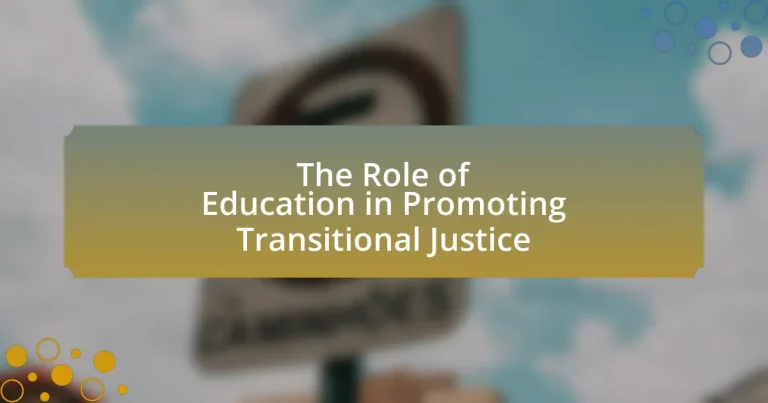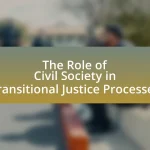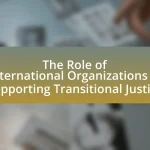The article examines the critical role of education in promoting transitional justice, emphasizing its importance in fostering awareness, understanding, and civic engagement regarding justice and reconciliation principles. It outlines how educational frameworks, such as human rights education and peace education, contribute to understanding historical injustices and accountability mechanisms. The article also discusses the challenges faced in integrating education with transitional justice, including political resistance and societal narratives, while highlighting best practices and methodologies for effective teaching. Additionally, it explores the impact of community involvement and technology in enhancing educational outcomes related to transitional justice.

What is the Role of Education in Promoting Transitional Justice?
Education plays a crucial role in promoting transitional justice by fostering awareness, understanding, and engagement with the principles of justice and reconciliation. It equips individuals with the knowledge of human rights, historical injustices, and the mechanisms available for addressing past wrongs. For instance, educational programs that include curricula on conflict resolution and the importance of accountability can help communities process their histories and build a foundation for peace. Research indicates that countries with educational initiatives focused on transitional justice experience higher levels of civic participation and social cohesion, which are essential for sustainable peace.
How does education contribute to the understanding of transitional justice?
Education enhances the understanding of transitional justice by providing individuals with the knowledge of historical injustices, legal frameworks, and the principles of accountability and reconciliation. Through curricula that include case studies of past conflicts and the mechanisms used to address them, education fosters critical thinking about the implications of justice and the importance of human rights. For instance, programs that teach about the Truth and Reconciliation Commissions in South Africa illustrate how education can inform citizens about the processes that facilitate healing and societal rebuilding after conflict. This understanding is crucial for promoting active participation in democratic processes and fostering a culture of peace and justice.
What are the key educational frameworks that support transitional justice?
Key educational frameworks that support transitional justice include human rights education, peace education, and civic education. Human rights education emphasizes the importance of understanding and advocating for human rights, which is essential in contexts of transitional justice where violations have occurred. Peace education focuses on conflict resolution and the promotion of social cohesion, helping communities heal and rebuild after conflict. Civic education fosters active citizenship and awareness of democratic processes, empowering individuals to participate in justice initiatives and governance. These frameworks collectively contribute to creating informed societies that can engage in and support transitional justice efforts effectively.
How does education facilitate awareness of human rights violations?
Education facilitates awareness of human rights violations by providing individuals with knowledge about their rights and the mechanisms to protect them. Through curricula that include human rights education, students learn about historical injustices, legal frameworks, and the importance of civic engagement. For instance, UNESCO emphasizes that education can empower individuals to recognize and challenge violations, fostering a culture of accountability. Furthermore, studies show that countries with comprehensive human rights education programs report higher levels of civic participation and advocacy against abuses, demonstrating the direct impact of education on awareness and action regarding human rights violations.
Why is education essential for fostering a culture of accountability?
Education is essential for fostering a culture of accountability because it equips individuals with the knowledge and skills necessary to understand their rights and responsibilities within a society. By promoting critical thinking and awareness of social justice issues, education empowers citizens to hold institutions and leaders accountable for their actions. Research indicates that educated populations are more likely to engage in civic activities, such as voting and advocacy, which are crucial for maintaining accountability in governance. For instance, a study by the World Bank found that higher levels of education correlate with increased civic participation and demand for government accountability, highlighting the direct link between education and a culture of accountability.
What role does education play in shaping public perceptions of justice?
Education plays a crucial role in shaping public perceptions of justice by providing individuals with the knowledge and critical thinking skills necessary to understand complex legal and social issues. Through curricula that include topics such as human rights, the rule of law, and civic responsibility, education fosters informed citizens who can engage in discussions about justice and advocate for equitable systems. Research indicates that societies with higher levels of education tend to have more robust democratic institutions and a greater public commitment to justice, as seen in studies by the United Nations Educational, Scientific and Cultural Organization (UNESCO) which highlight the correlation between education and civic engagement.
How can educational programs promote reconciliation in post-conflict societies?
Educational programs can promote reconciliation in post-conflict societies by fostering dialogue, understanding, and critical thinking among diverse groups. These programs often include curricula that emphasize shared histories, cultural awareness, and conflict resolution skills, which help to bridge divides and reduce prejudices. For instance, research conducted by the United Nations Educational, Scientific and Cultural Organization (UNESCO) highlights that education can serve as a tool for peacebuilding by integrating peace education into school systems, thereby equipping students with the necessary skills to engage in constructive dialogue and resolve conflicts peacefully. Additionally, educational initiatives that involve community participation can strengthen social cohesion and empower marginalized voices, further contributing to the reconciliation process.
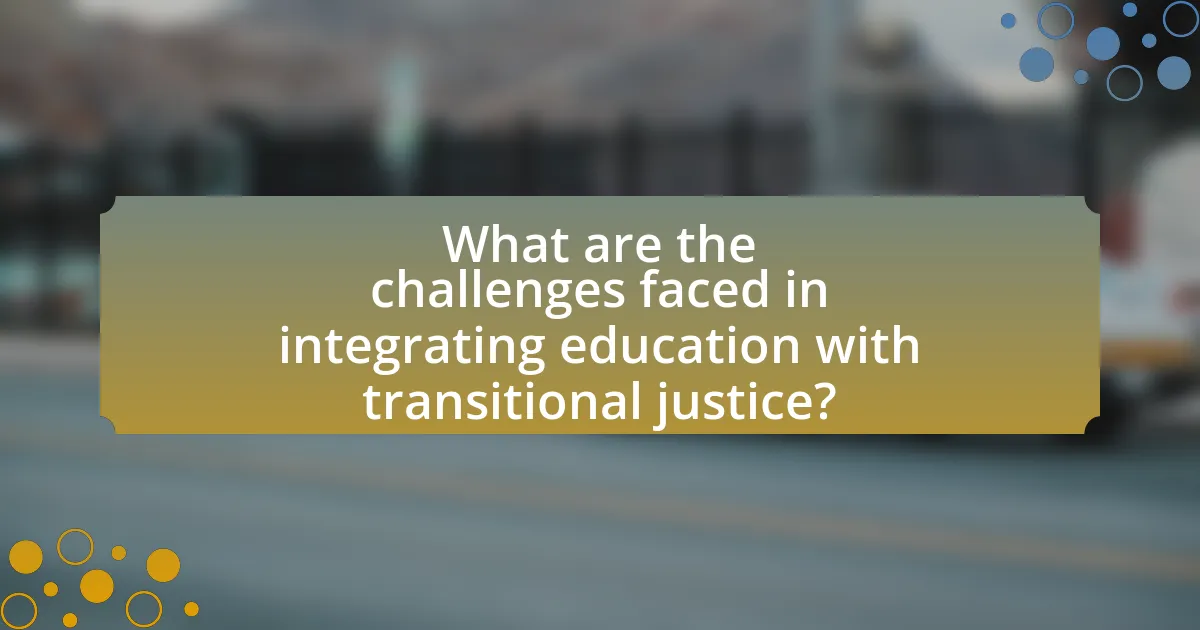
What are the challenges faced in integrating education with transitional justice?
Integrating education with transitional justice faces several challenges, including the lack of resources, political resistance, and differing societal narratives. Limited funding often hampers the development of educational programs that address historical injustices, as evidenced by the United Nations Educational, Scientific and Cultural Organization (UNESCO) reporting that many post-conflict countries struggle to allocate sufficient budgets for educational reforms. Political resistance arises when governments or influential groups oppose the acknowledgment of past atrocities, which can lead to a reluctance to incorporate these topics into curricula. Additionally, differing societal narratives complicate the integration process, as communities may have conflicting views on historical events, making it difficult to create a unified educational approach. These challenges hinder the effective promotion of transitional justice through education, as they prevent the establishment of a comprehensive and inclusive educational framework.
How do political contexts affect educational initiatives in transitional justice?
Political contexts significantly influence educational initiatives in transitional justice by shaping the priorities, funding, and implementation of these programs. For instance, in post-conflict societies, political stability or instability can determine whether educational initiatives are supported or suppressed. Countries like South Africa, where the political context allowed for the establishment of the Truth and Reconciliation Commission, saw educational programs that promoted understanding of past injustices. Conversely, in nations with ongoing political turmoil, such as Syria, educational initiatives may be limited or focused on propaganda rather than fostering reconciliation. The effectiveness of these educational programs often hinges on the willingness of political leaders to endorse and integrate transitional justice principles into the national curriculum, as seen in countries like Rwanda, where education has been pivotal in promoting unity after the genocide.
What barriers exist in implementing educational programs for transitional justice?
Barriers in implementing educational programs for transitional justice include lack of political will, insufficient funding, and societal resistance. Political will is often weak in post-conflict societies, where leaders may prioritize stability over justice, hindering the development of educational initiatives. Insufficient funding limits the resources available for curriculum development, teacher training, and outreach efforts, which are essential for effective program implementation. Societal resistance arises from differing perspectives on justice and reconciliation, where communities may be divided on the need for transitional justice education, leading to pushback against such programs. These barriers collectively impede the establishment of comprehensive educational frameworks necessary for promoting transitional justice.
How can educators overcome resistance to teaching about transitional justice?
Educators can overcome resistance to teaching about transitional justice by employing inclusive pedagogical strategies that engage students’ perspectives and experiences. By integrating local historical contexts and facilitating open discussions, educators can create a safe environment that encourages critical thinking and empathy. Research indicates that when students see the relevance of transitional justice to their own lives and communities, their engagement increases, making them more receptive to the subject. For instance, a study by the International Center for Transitional Justice highlights that contextualizing lessons within students’ own societal frameworks fosters understanding and reduces resistance.
What strategies can enhance the effectiveness of education in promoting transitional justice?
Integrating experiential learning strategies enhances the effectiveness of education in promoting transitional justice. Experiential learning, such as simulations, role-playing, and community engagement, allows learners to actively participate in understanding the complexities of justice processes. For instance, programs like the “Truth and Reconciliation Commission” in South Africa utilized educational workshops to foster dialogue and understanding among diverse groups, demonstrating how active participation can lead to deeper comprehension of transitional justice principles. Additionally, incorporating interdisciplinary approaches that combine history, law, and ethics can provide a comprehensive framework for understanding the implications of transitional justice, as evidenced by curricula developed in post-conflict societies that emphasize critical thinking and moral reasoning.
How can community involvement improve educational outcomes related to transitional justice?
Community involvement can significantly improve educational outcomes related to transitional justice by fostering a collaborative environment that enhances understanding and engagement. When communities actively participate in educational initiatives, they contribute local knowledge and perspectives that enrich the curriculum, making it more relevant and impactful. For instance, programs that include community voices in discussions about historical injustices can lead to a deeper comprehension of transitional justice principles among students. Research indicates that community-based educational approaches can increase student motivation and retention rates, as seen in the work by the United Nations Educational, Scientific and Cultural Organization (UNESCO), which highlights the importance of local context in education for peacebuilding. This involvement not only empowers students but also strengthens community ties, creating a supportive network that promotes ongoing dialogue about justice and reconciliation.
What role do technology and digital platforms play in education for transitional justice?
Technology and digital platforms play a crucial role in education for transitional justice by facilitating access to information, promoting dialogue, and enhancing engagement among diverse stakeholders. These platforms enable the dissemination of educational materials related to human rights, historical injustices, and reconciliation processes, making them accessible to a broader audience. For instance, online courses and webinars can reach individuals in conflict-affected areas, providing them with knowledge about their rights and the mechanisms available for justice. Additionally, social media serves as a tool for fostering discussions and sharing personal narratives, which can contribute to collective memory and healing. Research indicates that digital storytelling initiatives have successfully engaged communities in dialogue about past atrocities, thereby promoting understanding and empathy.
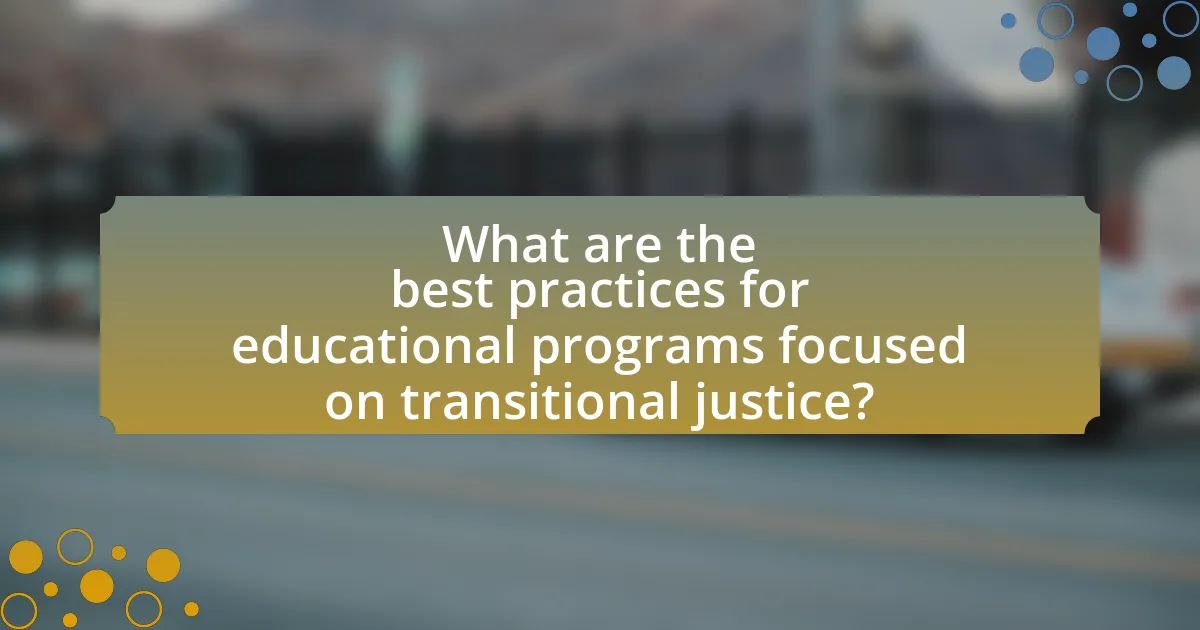
What are the best practices for educational programs focused on transitional justice?
The best practices for educational programs focused on transitional justice include integrating local narratives, fostering critical thinking, and promoting inclusivity. Educational programs should incorporate local histories and experiences of conflict to ensure relevance and resonance with participants. For instance, programs that utilize testimonies from victims and survivors can enhance understanding and empathy, as evidenced by the success of initiatives like the South African Truth and Reconciliation Commission’s educational outreach. Additionally, fostering critical thinking skills enables participants to analyze complex issues surrounding justice and reconciliation, which is crucial for informed civic engagement. Programs should also prioritize inclusivity by engaging diverse community groups, ensuring that marginalized voices are heard, as demonstrated by the inclusive approaches taken in post-conflict societies like Rwanda. These practices collectively contribute to a more effective educational framework that supports the goals of transitional justice.
How can curricula be designed to effectively teach transitional justice?
Curricula can be designed to effectively teach transitional justice by integrating interdisciplinary approaches that encompass history, law, ethics, and social sciences. This design should include case studies of successful transitional justice processes, such as South Africa’s Truth and Reconciliation Commission, which illustrates the importance of addressing past human rights violations through restorative justice mechanisms. Additionally, incorporating experiential learning opportunities, such as simulations or role-playing exercises, can enhance students’ understanding of the complexities involved in transitional justice. Research indicates that active learning strategies significantly improve retention and engagement, making the subject matter more relatable and impactful for students.
What methodologies are most effective in engaging students with transitional justice topics?
Interactive methodologies, such as experiential learning, case studies, and simulations, are most effective in engaging students with transitional justice topics. Experiential learning allows students to immerse themselves in real-world scenarios, fostering a deeper understanding of complex issues. Case studies provide concrete examples of transitional justice processes, enabling students to analyze and discuss specific instances, which enhances critical thinking. Simulations, such as role-playing exercises, encourage students to embody different perspectives, promoting empathy and a nuanced grasp of the subject matter. Research indicates that these methodologies significantly improve student engagement and retention of information, as they actively involve learners in the educational process.
How can educators assess the impact of their programs on students’ understanding of transitional justice?
Educators can assess the impact of their programs on students’ understanding of transitional justice through a combination of qualitative and quantitative methods. These methods include pre- and post-program surveys to measure changes in knowledge and attitudes, focus group discussions to gather in-depth insights, and assessments of student projects or presentations that reflect their understanding of transitional justice concepts. Research indicates that structured assessments, such as the use of rubrics for evaluating student work, can provide concrete evidence of learning outcomes. For instance, a study by the United Nations Educational, Scientific and Cultural Organization (UNESCO) highlights that effective evaluation frameworks can significantly enhance educators’ ability to gauge student comprehension in complex subjects like transitional justice.
What resources are available for educators interested in transitional justice?
Educators interested in transitional justice can access a variety of resources, including academic journals, online courses, and organizations dedicated to the field. Notable academic journals such as the “International Journal of Transitional Justice” provide peer-reviewed articles that explore theoretical and practical aspects of transitional justice. Online platforms like Coursera and edX offer courses on human rights and transitional justice, enabling educators to enhance their understanding and teaching methods. Additionally, organizations such as the International Center for Transitional Justice and the United Nations offer toolkits, reports, and educational materials that can be utilized in classroom settings to foster discussions on justice, accountability, and reconciliation. These resources collectively support educators in effectively teaching transitional justice concepts and practices.
Where can educators find training and support for teaching transitional justice?
Educators can find training and support for teaching transitional justice through organizations such as the International Center for Transitional Justice (ICTJ) and the United Nations Educational, Scientific and Cultural Organization (UNESCO). The ICTJ offers resources, workshops, and training programs specifically designed for educators to enhance their understanding and teaching of transitional justice concepts. UNESCO provides educational materials and guidelines that support the integration of transitional justice into curricula. These organizations are recognized for their expertise and commitment to promoting education in this critical area, ensuring that educators have access to the necessary tools and knowledge to effectively teach transitional justice.
What organizations provide materials and guidance for educational initiatives in transitional justice?
Organizations that provide materials and guidance for educational initiatives in transitional justice include the International Center for Transitional Justice (ICTJ), the United Nations Educational, Scientific and Cultural Organization (UNESCO), and the International Criminal Court (ICC). The ICTJ offers resources such as reports, toolkits, and training programs focused on transitional justice practices. UNESCO promotes education for peace and reconciliation, providing guidelines and educational materials that support transitional justice efforts. The ICC engages in outreach and educational initiatives to inform communities about international justice and accountability mechanisms. These organizations collectively contribute to the development of educational frameworks that enhance understanding and implementation of transitional justice principles.
What practical steps can educators take to promote transitional justice in their classrooms?
Educators can promote transitional justice in their classrooms by integrating curricula that focus on human rights, historical injustices, and conflict resolution. This can be achieved through the inclusion of case studies that illustrate successful transitional justice processes, such as South Africa’s Truth and Reconciliation Commission, which aimed to address past human rights violations and foster national healing. Additionally, educators can facilitate discussions and debates on current events related to justice and accountability, encouraging students to critically analyze different perspectives. Incorporating role-playing exercises can also help students understand the complexities of transitional justice by simulating real-life scenarios. Furthermore, inviting guest speakers who have experienced or worked in transitional justice contexts can provide firsthand insights, making the subject matter more relatable and impactful. These steps not only educate students about transitional justice but also empower them to engage in civic discourse and advocate for justice in their communities.
